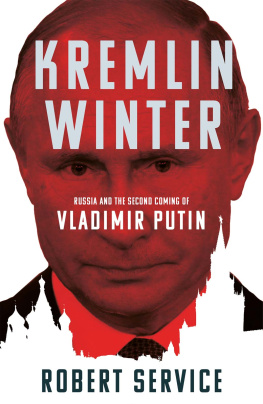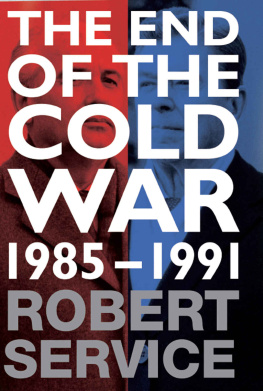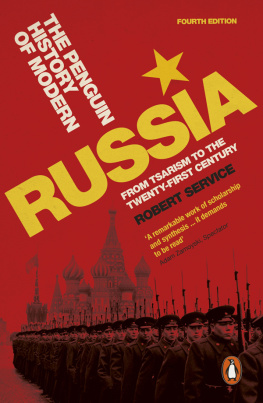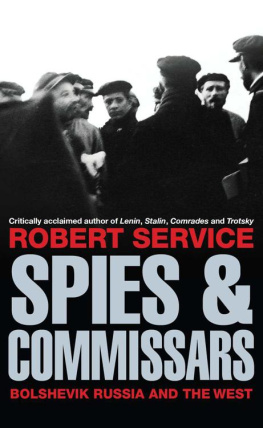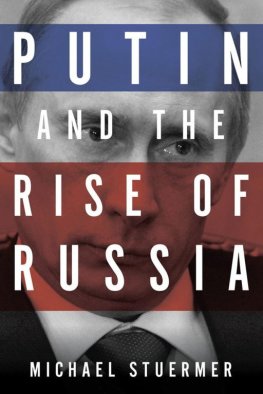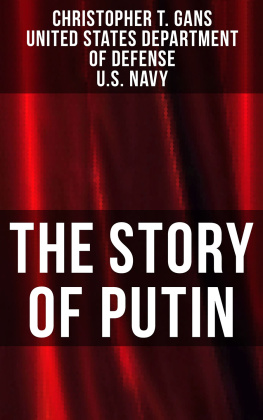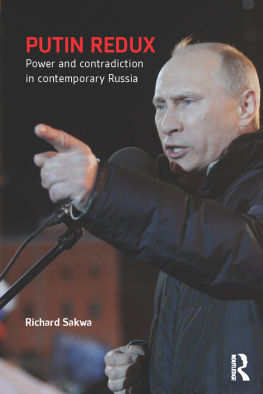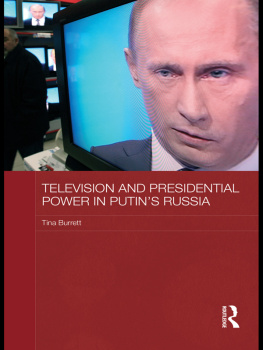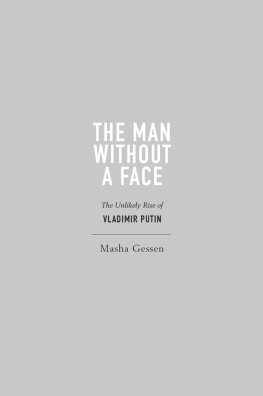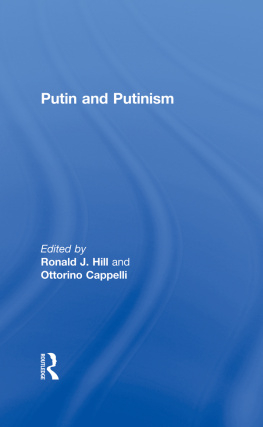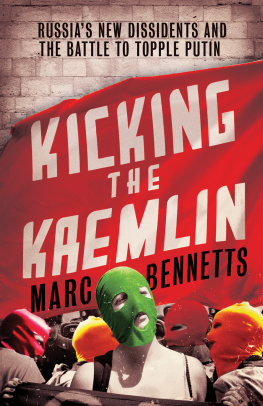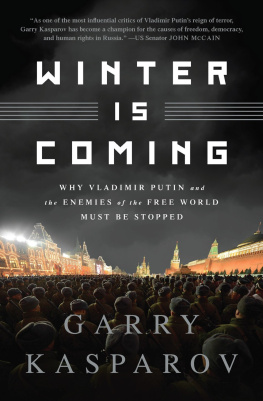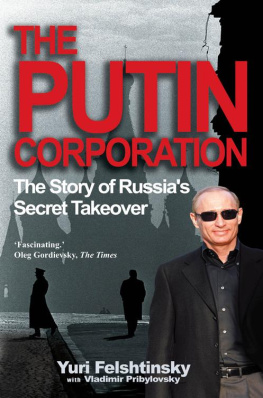About the Author
ROBERT SERVICEis a Fellow of the British Academy andof St Antonys College, Oxford. He haswritten several books, including thehighly acclaimed Lenin: A Biography,Russia: Experiment with a People,Stalin: A Biography, Comrades!: AHistory of World Communism, and,most recently, The Last of the Tsars, aswell as many other books on Russiaspast and present. Trotsky: A Biographywas awarded the 2009 Duff CooperPrize. Married with four children,he lives in London.
Acknowledgements
On a windy day at Lingfield Park races in 2015 our son Owain suggested backing an unfancied Irish bay gelding by name of Putin. He was putting up the idea, I discovered, for no other reason than that he wanted to hear me shouting Cmon, Putin! in the final stretch. The gallant horse disappointed its backers that day, finishing fifth in a field of nine.
The better-known Putin has yet to enter an electoral race without possessing a boiler-plated guarantee of victory, and he and his administration constitute the core of the chapters that follow. I came to this project after serving as a witness in the Berezovski v. Abramovich trial in 201112 and the Litvinenko public inquiry in 201516. No one at those proceedings was left in doubt about the deep entanglement of the internal and external factors in Russias politics. Nor was it possible to remain unconscious of the dangers and opportunities in Russian public life as well as of the balance between its volatilities and immobilism.
I also benefited from advice given by some of those who have had an influence on Russian affairs at the highest level. I am especially indebted to Catherine Ashton, Toomas Hendrik Ilves, Henry Kissinger, Roderic Lyne, Michael McFaul, Vadim Prokhorov, Jean-Arthur Rgibeau and Radek Sikorski, whom I thank for sharing their experiences in politics, diplomacy and the law.
Colleagues at the Hoover Institution, Stanford and St Antonys College, Oxford have kindly looked at sections of the book: I am grateful to Roy Allison, Michael Bernstam, Paul Chaisty, Charles Hill and Amir Weiner for this help and for our many productive conversations. I also owe a debt of thanks to Luke Harding and Roderic Lyne for reading particular chapters. At Stanford it was helpful to exchange ideas on contemporary Russia with John Dunlop, Paul Gregory and David Holloway. For a book of this kind, it was essential to read as widely as possible and I appreciate advice offered by Timothy Garton Ash, Joerg Baberowski, Peter Duncan, Chris Gerry, Robin Milner-Gulland, Philip Hanson, Dan Healey, Thomas Henriksen, Beka Kobakhidze, Svetlana McMillin, Andrew Monaghan, Keith Sidwell, Maciej Siekierski, Steve Tsang and Alexandra Zernova.
My wife Adele Biagi and friends Bobo Lo and Liz Teague read the entire draft. At Picador, Georgina Morley did the same. They all made copious, persuasive suggestions for improvements and had reservations about the books analysis: I hope that the final version deals adequately with them.
A technical point merits emphasis. Putin lies at the core of the chapters even though he is far from being the sole originator of trends in Russian politics at home and abroad. His speeches and interviews are a crucial primary source. Available online in some abundance, they permit us to direct a sharp focus on what he thinks and does or at least on what he wants others to believe that he thinks and does. The translations on his presidential website, however, are not always reliable, which is why I have usually supplied my own attempts.
The copiousness of public statements, however, does not disguise the fact that Putins Kremlin is more secretive than Yeltsins ever was. Unfortunately several recent accounts contain sheer speculation dressed up as certainty, and it is important to recognize that there are many known unknowns in Russian current affairs and, probably, an even greater number of unknown unknowns and Western analysis, and any policy that is developed from it, needs to be rooted in the ground of what can be duly authenticated. Russia is too important to have its politics exaggerated, over-simplified or turned into a fantasy.
Much of the research for this book was done in the Hoover Institution Archives and Library. It was a matter of surprise and pleasure to examine so many valuable holdings on contemporary Russia, from the giant Putin puppet (see ) and the in-house FSB journal Sluzhba bezopasnosti to the piles of Opposition pamphlets. My stays at Hoover were enabled by support from the Sarah Scaife Foundation, to which I express my warmest thanks. I am grateful to Hoover Institution Director Tom Gilligan and Library and Archives Director Eric Wakin for their indispensable assistance. Thanks also go to my literary agent David Godwin for his unstinting help.
Adele and I have had our lives enriched by our grandchildren. This book is dedicated to her and to them, not forgetting their parents.
Robert Service
April 2019
Also by Robert Service
The Bolshevik Party in Revolution: A Study in Organisational Change
Lenin: A Political Life
Volume One: The Strengths of Contradiction
Volume Two: Worlds in Collision
Volume Three: The Iron Ring
The Russian Revolution, 19001927
A History of Twentieth-Century Russia
Lenin: A Biography
Stalin: A Biography
Comrades: A History of World Communism
Trotsky: A Biography
Spies and Commissars: Bolshevik Russia and the West
The End of the Cold War: 19851991
Russia and its Islamic World: From the Mongol Conquest to the Syrian Military Intervention
The Last of the Tsars: Nicholas II and the Russian Revolution
Bibliography
Online sources
anticompromat.ru
archive.premier.gov.ru
atlas.media.mit.edu
auswaertiges-amt.de
bloomberg.com
clinton.presidentiallibraries.us
dassie2001.livejournal.com
data.worldbank.org
echo.msk.ru
gazeta.ru
interpretermag.com
intersectionproject.eu
lenta.ru
polit.ru
prezident.ru
ridl.io
ruleaks.net
Russkii WikiLeaks
skolesnikov.org
tass.com
unian.info
wikileaks.org
youtube.com
Periodicals
The Atlantic Monthly (Boston, MA)
Bild (Berlin)
Eurasia Daily Monitor (Jamestown)
Financial Times (London)
Foreign Affairs (New York)
Guardian (London)
Kommersant (Moscow)
Komsomolskaya pravda (Moscow)
Moskovskie novosti (Moscow)
Moskovskii komsomolets (Moscow)
New Statesman (London)
Nezavisimaya gazeta (Moscow)
New York Times (New York)
The New Yorker (New York)
Nouvel Observateur (Paris)
Novaya gazeta (Moscow)
Le Point (Paris)
Post-Soviet Affairs
Pravda (Moscow)
Rossiiskaya gazeta (Moscow)
Russkaya pravda (Kyiv)
Russkii Blok Sevastopolya (Sevastopol)
Sluzhba bezopasnosti (Moscow)
Time (New York)
Vedomosti (Moscow)
Washington Post (Washington DC)
Books and articles
A. Adamishin, V raznye gody: vneshnepoliticheskie ocherki (Ves mir: Moscow, 2016)
D. Allan, Managed Confrontation: UK Policy Towards Russia After the Salisbury Attack, research paper, Chatham House, London, October 2018
R. Allison, Protective Integration and Security Policy Coordination: Comparing the SCO and CSTO, Chinese Journal of International Relations, no. 3 (2018)
, Russia and the Post-2014 International Legal Order, Revisionism and Realpolitik,

